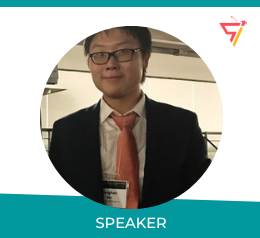Scholars
Frontiers in Chemistry Forum
THEME: "Excellence and Innovation in Chemistry"
 20-21 Jun 2022
20-21 Jun 2022  NH Potsdam, Berlin, Germany & Online
NH Potsdam, Berlin, Germany & Online THEME: "Excellence and Innovation in Chemistry"
 20-21 Jun 2022
20-21 Jun 2022  NH Potsdam, Berlin, Germany & Online
NH Potsdam, Berlin, Germany & Online 
University of Waterloo, Canada
Title: Developing Vibrational Electronic Coupled Cluster (VECC) method: a novel approach for simulations of non-adiabatic vibrational resolved electronic spectra
Mr Songhao Bao, currently a PhD student at University of Waterloo studying theoretical / computational chemistry which is an interdisciplinary subject that combines knowledge of chemistry, quantum physics and computer science to develop software and algorithms for molecular modeling. I pursue an academia career. I believe that the behavior of microscopic world (atom / molecule) could be understood at a fundamental level via first principles with the resort of computer simulations. This could be both beneficial for industry applications and metaphysically manifest my ultimate goal to seek the timeless truth of the world. However, I am also interested in some state of the art technology that have positive impact on humanity. I am especially interested in the application of artificial intelligence and believe that it is a game changer on many fields for both fundamental science and conventional industry.
Non-adiabatic dynamics is associated with many photo-electron chemical processes where the nuclear motion of the molecule is strongly coupled with its electronic structure and the Born-Oppenheimer approximation becomes invalid. To simulate such dynamical process, vibronic coupling models need to be introduced. The construction of vibronic models is non- trivial. To avoid the divergence of the gradient at the conical intersection, diabatization procedure need to be introduced to transform from adiabatic basis to diabatic basis. In this talk, we introduce an efficient algorithm that could simulate the wave packet dynamics of the non-adiabatic vibronic models in diabatic basis. This approach parameterized the time-dependent wavefunction using coupled cluster-like exponential ansatz without introducing basis set. In this way, unlike conventional basis set based method to simulate the wave packet dynamics, our approach avoids exponential scaling over the size of the system. As a result, in our approach, the propagation is conducted by time integrations over coupled cluster residue equations, which involves a few tensor products and has classical-like (polynomial) scaling over size of the system. As an application of our computational method, we simulate gas phase absorption electronic spectra of large organic compounds. This application would provide reference for characterizations for experimental chemists and what is more, it could potentially provide insights to photo-electron based chemical processes.